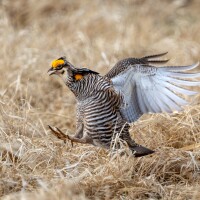HAMDEN SLOUGH NATIONAL WILDLIFE REFUGE — What does springtime sound like on the booming grounds of Greater Prairie-Chickens? Listen:

Males blow out vibrant orange-colored air sacs on their necks to produce a low-frequency booming sound and stand-up neck feathers, known as pinnae feathers, as part of their courtship display.
They often follow up with a rapid-fire, foot-stomping little dance and will confront competitors in aggressive faceoffs.
The booming can be heard from over a mile away. Other vocalizations include whooping, whining and cackling at higher sound frequencies.
A morning on the booming grounds is a boisterous affair of activity and sounds.
It’s a sort of Prairie-Chickens Got Talent, with males stepping onto the booming ground stage to showcase their skills and defend territories. Female attendees act as a panel of judges. And we’re their audience, hidden away in blinds, with a front-row seat to the show.

Contributed
/
Lorie Shaull | 
Contributed
/
Lorie Shaull |
The age-old rituals are lively entertainment, although it's hard for us to know which Prairie-Chicken has the most talent; in other words, which Prairie-Chicken will get to mate with the most females. That call is left to the trained eye of the judges.


To the casual viewer, it may seem an inordinate amount of energy spent on the process of attracting a potential mate. But then again, what human can’t relate to spending inordinate amounts of energy on attracting a potential partner? It’s a relatable ritual.
At one time, Minnesota was about half prairie and the sights and sounds of Prairie-Chickens were common during springtime. But, over the years, changing land use greatly impacted their habitat, thus affecting their survival. Currently, Prairie-Chickens are designated a species of special concern by the Minnesota Department of Natural Resources.
Thanks to various conservation programs, Prairie-Chicken habitat, primarily in the northwestern part of the state, is managed by various conservation groups and includes input and work by the Minnesota Prairie-Chicken Society.
The Minnesota Prairie-Chicken Society was my primary resource for finding a blind on booming grounds. It’s a popular activity and reservations must be made well in advance.

I reserved a blind at the Hamden Slough National Wildlife Refuge outside of Detroit Lakes and, in a helpful follow-up email from wildlife biologist Rebecca Esser, directions were sent on specifics for the day of my visit. We were instructed to arrive at least 45 minutes before sunrise and to do our best not to make a lot of noise that would disrupt activities on the booming grounds: arrive quietly, stay quiet, leave quietly.
And also, dress warmly and plan your coffee drinking ahead of time because you will need to stay in the blind for about three to four hours until the Prairie-Chickens disperse for the morning. This last bit may have been the most challenging part of the journey for me.
By the way, it’s shockingly difficult to walk a 300-meter straight line on the prairie out to the blind in complete darkness. It’s not an understatement to say I lost my way more than a couple times.

All in all, it was wonderful springtime ritual to get to witness in person. And if one is a bucket list sort of a person, this should be on it. I felt fortunate to be able to sit so close to the Prairie-Chickens and get a brief glimpse into their world. Afterward, I immediately joined the Minnesota Prairie Chicken Society and got myself on the list to watch again next year.
So hats off to this year’s Prairie-Chicken with the most talent. There may have been some losers in the judges' eyes but, to this new Prairie-Chicken fan, all contestants were winners and put on a spectacular show!



